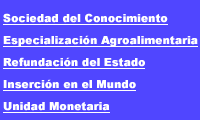


| |
| La virtud de la hegemonía americana . |
Artículo publicado en Cuadernos de Pensamiento Político nº 1 Págs. 161 a 174, Madrid, Octubre, 2003. |
| Introducción Las nuevas condiciones de la seguridad La voluntad de América No hay alternativas a los Estados Unidos Un imperio post-imperial Notas Notas [i] Fukuyaa, Francis: “The end of History?” en The National Interest verano de 1989. [ii] Bush, George H.: “Speech at the graduation Exercises at West point”. En We will prevail. President George W. Bush On War, terrorism, and Freedom. Nueva York, Continuum press 2003, pág. 159. [iii] Hassner, Pierre y Vaïse, Justin: Washington et le Monde. Dilemmes d’une superpuissance. Paris, Autrement 2003, pág 85. [iv] Citado en Millière, Guy: Ce que veut Bush. La recomposition du Monde.Paris, edition La Martinière 2003, pág.61. [v] Bush, George H.: State of the Union Address. Reproducido en We will prevail. Op. Cit., pp. 108 y 109. [vi] Para los entresijos de dicha formulación, véase la obra del speechwriter de George Bush, Frum, David: The right Man: the surprise presidency of George W. Bush. Nueva York, Random House 2003. [vii] Kagan, Robert y Kristol, William: “The Bush Era” en The Weekly Standard, 11 de febrero de 2002, pçag. 7. [viii] Ikenberry, John: “America’s Imperial Ambition” en Foreign Affairs vol. 81, nº 5, septiembre/octubre de 2002. [ix] Hay una abundante bibliografía al respecto. Una buena introdccuín al tema puede ser Sloan, Elinor C: The Revolution in Military Affairs. Montreal, McGill-Queens University Press 2002; en castellano se puede consultar los trabajos del Grupo de Estudios Estratégicos (GEES) para el seminario de FAES “La RMA y España, mayo/junio de 2000 en www.gees.org análisis nº 6. [x] Véase al respecto Viahos, Michael: “Military Identity in the Age of Empire” en www.techcentralstation.com, 19 de junio de 2003. [xi] Para una elaboración teórica y sofisticada del “compromiso selectivo” pueden consultarse dos obras de reciente aparición: Art, Robert: A grand Strategy for America. Ithaca (NY), Cornell University Press 2003; y Hirsh, Michael: At War with Ourselves. Oxford/Nueva York, Oxford University Press 2003. [xii] Krauthammer, Charles: “The unipolar moment”, Foreign Affairs, vol. 71 nº 1, 1991. [xiii] Una de las críticas más feroces y recientes de la continua actitud de Clinton puede encontrarse en Minister, Richard: Losing Bin Laden: How Bill Clinton's Failures Unleashed Global Terror, New York, Reignerer Publishing 2003. [xiv] Rice, Condoleezza: “Campaign 2000: Promoting the National Interest” en Foreign Affairs, enero/febrero 2000. [xv] Haass, Richard: The reluctant sheriff: The United States and the world after the Cold War. Nueva York, Council on Foreign Relations 1997. [xvi] The United States Is, and Should Be, an Empire, a debate en www.AEI.org, 17 de julio de 2003. [xvii] Véase entre otros el discurso en West Point de 1 de junio de 2002, en we will prevalí. Op. Cit. Pp. 158 y ss. [xviii] Schmitt, Gary: “Power and duty: US actino is crucial to manteining World Order” en Los Angeles Times 23 de marzo de 2003. [xix] Zakaria, Fareed: “The arrogant Empire” en Newsweek, 24 de marzo de 2003 [xx] Kagan, Robert: “The benevolent Empire” en Foreign Policy nº 111, verano de 1998, pág. 26. [xxi] Ignatieff, Michael: “The burden” en The New York Times Magazine, 5 de enero de 2003. [xxii] Muravchik, Joshua: The Imperative of American leadership. Washington, The American Enterprise Institute Press 1996. [xxiii] A este respecto debe consultarse la obra de Nye, Joseph: The paradox of American Power.Nueva York/Oxford, Oxford University Press 2003. En cualquier caso al autor le sirve la necesidad de emplear tanto el hard power como el sofpower como crítica al presidente Bush, quien, en su opinión, está descuidando este último aspecto por su marcado unilateralismo, actitud que genera rechazo. [xxiv] Kaplan, Lawrence F. y Kristol, William: The War over Iraq. Saddam’s tyranny and America’s Mission. San Fracisco (Cal), Encounter books 2003, pág.VIII. |
| Rafael L. Bardají , 20/05/2004 |

| Inicio | Arriba |


